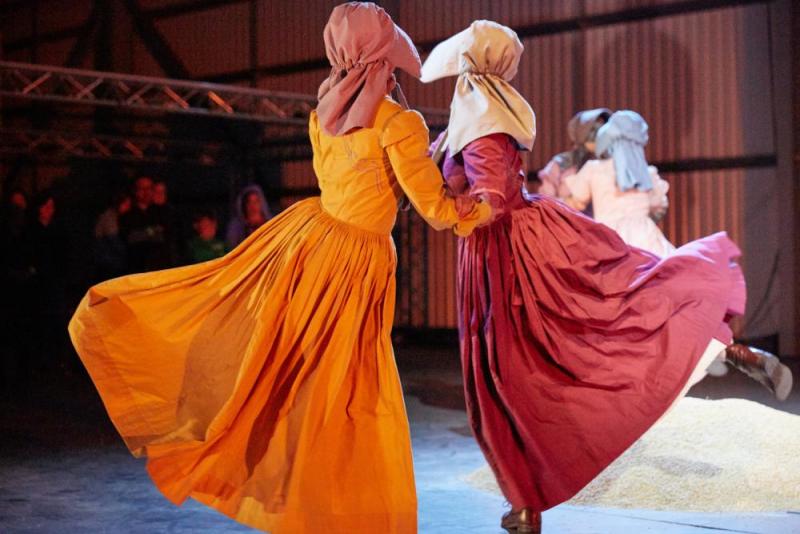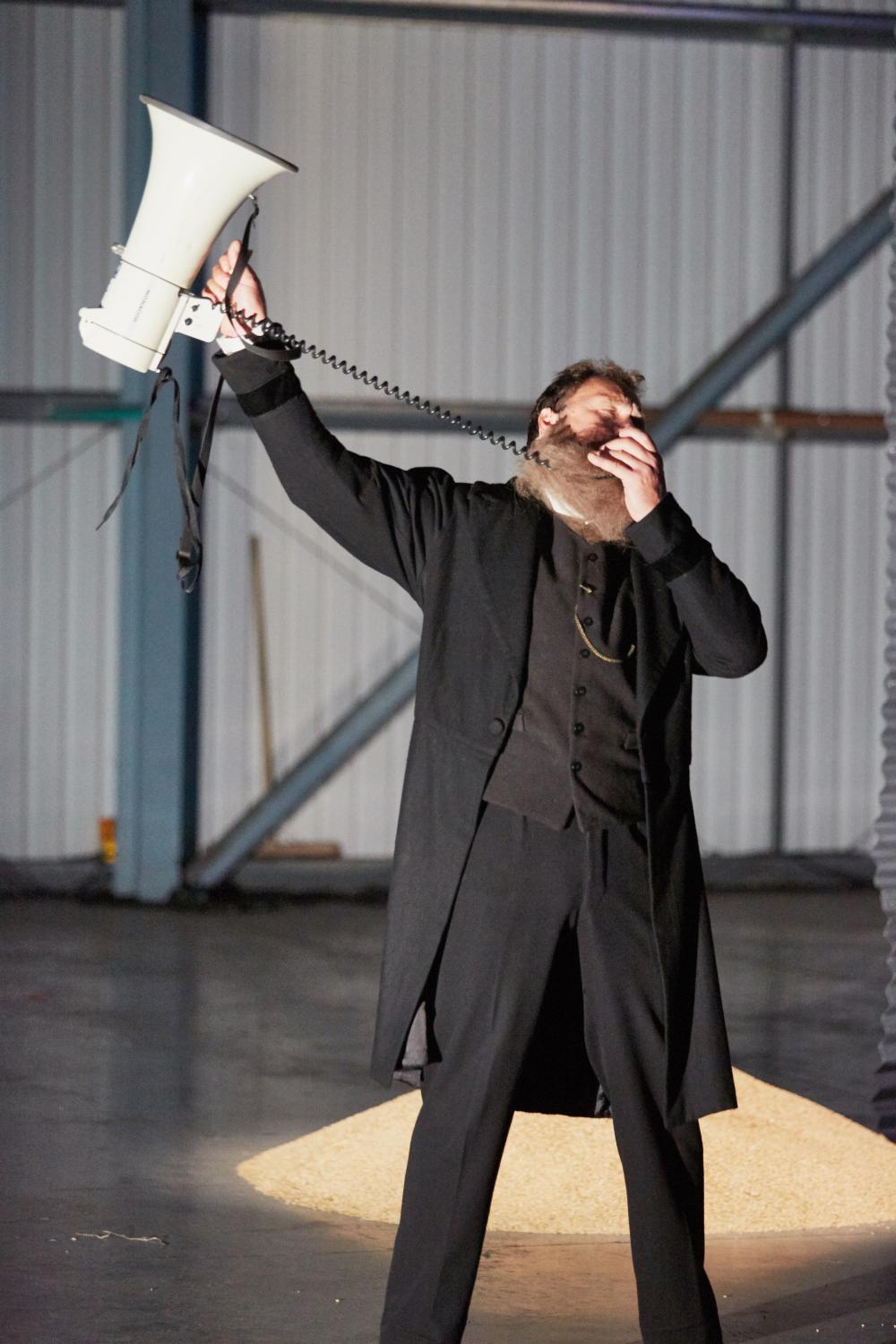{150}, National Theatre Wales/Theatr Genedlaethol Cymru | reviews, news & interviews
{150}, National Theatre Wales/Theatr Genedlaethol Cymru
{150}, National Theatre Wales/Theatr Genedlaethol Cymru
Bold and technically dazzling, the energy of Marc Rees’ Patagonian tale flags too often

The brackets around {150} are ambiguous, almost apologetic. The 150th anniversary of Y Wladfa (The Colony), the semi-legendary "oasis of Welshness" in the Patagonian wilderness has given occasion in Wales for the celebration of a most unlikely story. One hundred and fifty men, women and children left their homes all over Wales and created a new life for themselves, against all the odds, at the other end of the world.
The Royal Opera Stores, a hangar-sized warehouse on an industrial park overlooked by the classic Welsh landscape of terraced housing clinging to picturesque hillsides plays host to the first-ever collaboration between Wales’ two national theatres, the English-language NTW and the Welsh-language Theatr Genedlaethol Cymru. To make matters more complicated still, the production interweaves excerpts from a forthcoming S4C film, Galesa, which also features a heavy smattering of Argentinian Spanish.
At the centre of it all is regular NTW collaborator Marc Rees, who brings his signature style of theatrical-artistic puppet-mastery to bear on what amounts to a "live documentary": visual vignettes, discomfiting soundscapes and a general mood of playful discombobulation make {150} an irreverent take on the sesquicentennial that nevertheless fails to capture head and heart all at once.
Bonneted women clutch thick black family bibles to their breasts like babies, a language and culture held to their hearts. There are cameos for Michael D Jones (Dafydd Emyr, pictured below left), the preacher whose brainchild the colony was, and for John Daniel Evans, an escapee from a band of natives who impaled his three companions, scattering their skeletons and "inserting their severed sex organs into their mouths". There are quotations from Welsh nationalist playwright and Plaid Cymru founder Saunders Lewis, a video clip of beat poet Allen Ginsberg’s "Wales Visitation, 1967" and the voice of Eluned Morgan, Y Wladfa’s de facto writer-in-residence, looms large.
 There is another history at play here too. In his scripted introduction, Rees acknowledges a debt to Mike Pearson’s play Patagonia, performed at the Royal Court in the early 1990s. Brith Gof, Pearson’s company of site-specific specialists have an enduring legacy in Wales that this collaboration cements. Both NTW and Theatr Gen have become expert in staging events on a grand scale, productions which – like the story of Y Wladfa itself – become lodged in the national consciousness. But despite {150} being, truly, a significant event, its luxuriating over two and a half hours and multiple media mean there are too many lulls. Galesa seems what it is: a separate work. Sometimes less is more, and bigger isn’t always better.
There is another history at play here too. In his scripted introduction, Rees acknowledges a debt to Mike Pearson’s play Patagonia, performed at the Royal Court in the early 1990s. Brith Gof, Pearson’s company of site-specific specialists have an enduring legacy in Wales that this collaboration cements. Both NTW and Theatr Gen have become expert in staging events on a grand scale, productions which – like the story of Y Wladfa itself – become lodged in the national consciousness. But despite {150} being, truly, a significant event, its luxuriating over two and a half hours and multiple media mean there are too many lulls. Galesa seems what it is: a separate work. Sometimes less is more, and bigger isn’t always better.
The whole thing comes to life when a cast of young performers present the story of Y Wladfa at an imagined Eisteddfod, as it does when the bonneted non-Conformists inexplicably transmogrify into a weird amalgam of 21st-century hedonists and Bavarian bierkeller girls. The conceit surrounding their scattering of grain gives us a genuine, tactile connection with the unthinkably hard lives endured by the pioneers, but for the most part we remain what we are: onlookers from an altogether different time and place.
The production cannot be faulted for its ambition or the audacity of its scale. As a technical achievement {150} is stupendous; the set changes, in a venue quite literally packed to the rafters with stage equipment, are breathtaking. And after two and a half hours of promenade patchwork production, the moving final sequence that places us back in the landscape of Wales is confirmation that {150} is less about the anniversary of the colony and more about those hardy 150 souls, names listed here on packing boxes, whose echoes down the halls of history get ever louder over time. One can only wonder at what they might have made of it all.
rating
Share this article
The future of Arts Journalism
You can stop theartsdesk.com closing!
We urgently need financing to survive. Our fundraising drive has thus far raised £49,000 but we need to reach £100,000 or we will be forced to close. Please contribute here: https://gofund.me/c3f6033d
And if you can forward this information to anyone who might assist, we’d be grateful.

Subscribe to theartsdesk.com
Thank you for continuing to read our work on theartsdesk.com. For unlimited access to every article in its entirety, including our archive of more than 15,000 pieces, we're asking for £5 per month or £40 per year. We feel it's a very good deal, and hope you do too.
To take a subscription now simply click here.
And if you're looking for that extra gift for a friend or family member, why not treat them to a theartsdesk.com gift subscription?
more Theatre
 Troilus and Cressida, Globe Theatre review - a 'problem play' with added problems
Raucous and carnivalesque, but also ugly and incomprehensible
Troilus and Cressida, Globe Theatre review - a 'problem play' with added problems
Raucous and carnivalesque, but also ugly and incomprehensible
 Clarkston, Trafalgar Theatre review - two lads on a road to nowhere
Netflix star, Joe Locke, is the selling point of a production that needs one
Clarkston, Trafalgar Theatre review - two lads on a road to nowhere
Netflix star, Joe Locke, is the selling point of a production that needs one
 Ghost Stories, Peacock Theatre review - spirited staging but short on scares
Impressive spectacle saves an ageing show in an unsuitable venue
Ghost Stories, Peacock Theatre review - spirited staging but short on scares
Impressive spectacle saves an ageing show in an unsuitable venue
 Hamlet, National Theatre review - turning tragedy to comedy is no joke
Hiran Abeyeskera’s childlike prince falls flat in a mixed production
Hamlet, National Theatre review - turning tragedy to comedy is no joke
Hiran Abeyeskera’s childlike prince falls flat in a mixed production
 Rohtko, Barbican review - postmodern meditation on fake and authentic art is less than the sum of its parts
Łukasz Twarkowski's production dazzles without illuminating
Rohtko, Barbican review - postmodern meditation on fake and authentic art is less than the sum of its parts
Łukasz Twarkowski's production dazzles without illuminating
 Lee, Park Theatre review - Lee Krasner looks back on her life as an artist
Informative and interesting, the play's format limits its potential
Lee, Park Theatre review - Lee Krasner looks back on her life as an artist
Informative and interesting, the play's format limits its potential
 Measure for Measure, RSC, Stratford review - 'problem play' has no problem with relevance
Shakespeare, in this adaptation, is at his most perceptive
Measure for Measure, RSC, Stratford review - 'problem play' has no problem with relevance
Shakespeare, in this adaptation, is at his most perceptive
 The Importance of Being Earnest, Noël Coward Theatre review - dazzling and delightful queer fest
West End transfer of National Theatre hit stars Stephen Fry and Olly Alexander
The Importance of Being Earnest, Noël Coward Theatre review - dazzling and delightful queer fest
West End transfer of National Theatre hit stars Stephen Fry and Olly Alexander
 Get Down Tonight, Charing Cross Theatre review - glitz and hits from the 70s
If you love the songs of KC and the Sunshine Band, Please Do Go!
Get Down Tonight, Charing Cross Theatre review - glitz and hits from the 70s
If you love the songs of KC and the Sunshine Band, Please Do Go!
 Punch, Apollo Theatre review - powerful play about the strength of redemption
James Graham's play transfixes the audience at every stage
Punch, Apollo Theatre review - powerful play about the strength of redemption
James Graham's play transfixes the audience at every stage
 The Billionaire Inside Your Head, Hampstead Theatre review - a map of a man with OCD
Will Lord's promising debut burdens a fine cast with too much dialogue
The Billionaire Inside Your Head, Hampstead Theatre review - a map of a man with OCD
Will Lord's promising debut burdens a fine cast with too much dialogue

Add comment